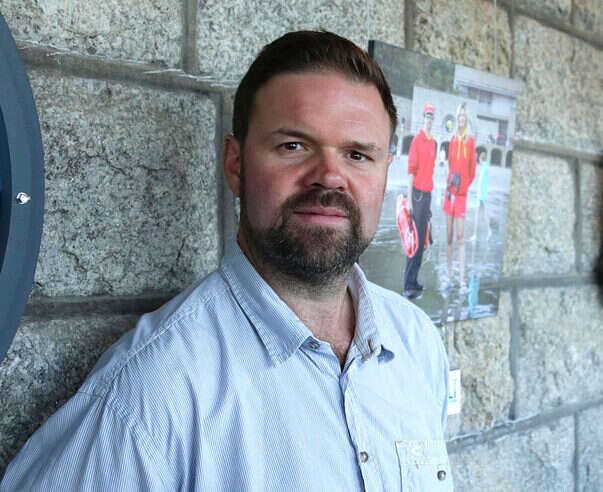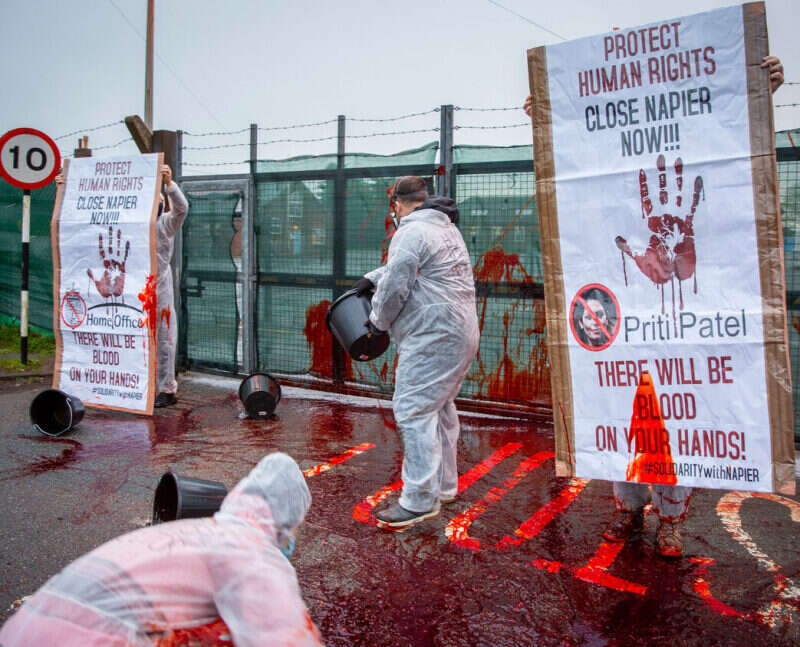
[Original story dated 1 February]
A photographer arrested at his home after covering a protest at a Covid-hit asylum centre in Kent believes the case is “significantly worrying” for press freedom in the UK.
Police came to Andy Aitchison’s home in Folkestone around seven hours after he took photos of a protest at Napier Barracks that lasted only about 30 seconds.
Update 22/10/21: Kent Police chief constable Alan Pughsley has apologised to Aitchison and the force is paying him damages for wrongful arrest.
Pughsley said: “Further to the damages received by Mr Aitchison in compensation, I apologise unreservedly to him for his unlawful arrest, false imprisonment and breach of his human rights.
“I expressly acknowledge there was no culpability on the part of Mr Aitchison, who was performing an important function publicising the protest in the public interest.
“I recognise the fundamental importance of free speech and the independence of journalists; I accept they should not be at risk of arrest and of having their equipment seized when acting lawfully in reporting matters of public interest.”
Aitchison said: “This feels like a very important outcome, that the police have acknowledged that photographers and journalists have a right to work. We must be able to work without fear of arrest and freedom to independently report on events. It is vital to our democracy that we are able to report on all issues, especially if they are politically sensitive.
“I hope that Kent Police have learnt from this situation and will work hard to ensure that this does not happen to any other official journalists.
“It was a stressful and totally unnecessary experience to go through, both professionally, and personally, not knowing what impact this could have on my work, and how distressing it was for my children to have to witness the whole thing.”
The 46-year-old told the officers he was a member of the press and showed them his National Union of Journalists press card but they responded that it “doesn’t matter”.
They seized the memory card from his camera and his mobile phone.
“It feels a bit like I’ve landed in a similar situation to a lot of journalists and photographers and it’s just a bit of a crazy place to be,” Aitchison told Press Gazette on Monday.
“It seems to be a different person every couple of weeks at the moment so I guess it’s just my turn.”
He went to the centre’s gates at about 7.45am on Thursday after receiving a tip-off that something might be happening, a common theme since asylum seekers began being housed at the barracks in September.
Soon about five or six people turned up wearing white boilersuits and face masks, throwing buckets of what looked like blood onto cardboard banners calling on the centre to be closed.
Aitchison stood in the road taking photos and asked them if it was really blood. They told him it was a concoction of food colouring, water and shampoo.
The barracks security guards then approached and the protesters threw their buckets on the ground and put their fists in the air, Aitchison said.
He then went to his home about five minutes away to edit the photos, put them on Getty and they were picked up that morning including by local news site Kent Live – which is where he believes police saw the photo with his credit.

Activists take radical action at Napier Barracks to highlight claims of human rights violations on 28 January 2021 in Folkestone, Kent. Picture: Andy Aitchison
Several hours later at about 3pm Aitchison’s nine-year-old son came into his office to tell him police officers were coming to the front door.
[Read more: Study reveals press freedom falling off the news agenda despite worsening global picture]
The police told Aitchison they were arresting him on suspicion of criminal damage and said: “We need to come in and search your property”.
“I said: ‘is this about the pictures I took this morning?’ They said yes,” Aitchison said.
He then handed over his camera’s memory card and the police also took his mobile phone from his desk.
Aitchison told the police: “I was taking pictures, how was I causing criminal damage? I am a member of the press.” He showed the officers his NUJ press card but they told him it “doesn’t matter”. He took it with him to the police station nonetheless.
He was in custody for about seven hours, although he was only interviewed for about 20 minutes at 7pm. He was eventually released on bail at 10.15pm.
Aitchison said he had never been arrested before and that the incident was “incredibly worrying”.
“It’s something I have never experienced before and something I never thought I would be experiencing just for doing my job. It feels like the way the press are being treated currently has gone up a gear or changed a gear and it’s going in a very dark and serious direction.
“It’s a worry for every member of the press, journalist or photographer, whoever it is, if you question something that people don’t like it feels like you get shut down.”
He was also concerned as he does frequent photography work within the criminal justice sector, including for non-governmental organisations and the prison newspaper Inside Time, and fears the arrest could limit his ability to work in prisons.
“That is a massive part of my income and if this is going to affect that then I have got to look at my options,” he said.
He has already been stopped from working as his bail conditions stop him going within a certain radius of Napier barracks – meaning he was unable to cover a huge breaking news story on Friday when a fire broke out at the site in a suspected arson attackl.
Aitchison has been released on bail until 22 February but is hoping the charges against him will be dropped before then “so I can get on with my job”.
Aitchison’s local MP is Damian Collins, chairman of the All-Party Parliamentary Group on media freedom.
Collins said he had raised the matter with Kent Police and “will continue to take a close interest in this case”.
Ian Murray, executive director of the Society of Editors said: “This is very concerning. We are constantly told journalists, including press photographers, are an essential part of our democratic system in this country and a free media is to be protected.
“But words are not enough. It is actions that count and arresting press photographers is not something that should be happening in a liberal democracy.”
A News Media Association spokesperson said: “This case raises serious concerns about press freedom. As the eyes and ears of the public, journalists must be able to report upon matters of public interest without fear of arrest or other forms of interference by the police.
“The UK should be a beacon for media freedom across the globe but incidents such as these tarnish that reputation and, ultimately, undermine our democratic way of life.”
The Foreign Office runs the UK’s campaign to defend global media freedom but told Press Gazette it normally responds to incidents in other countries, not domestically.
A Kent Police spokesperson said: “Kent Police was called following a report of a protest in Shorncliffe, Folkestone at around 8am on Thursday 28 January 2021. Officers attended and a 36-year-old man from the Dover area was arrested on suspicion of causing criminal damage.
“Further enquiries led to the arrest of a second man, aged 46, in Folkestone at around 3pm the same day. He was also arrested on suspicion of criminal damage.
“Both men have been released on bail until 22 February 2021.”
Picture: David Noble
Email pged@pressgazette.co.uk to point out mistakes, provide story tips or send in a letter for publication on our "Letters Page" blog
